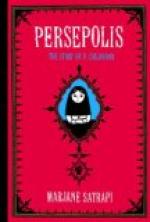He had got a fair use and a good profit out of Patrasche: being human, he was wise, and left the dog to draw his last breath alone in the ditch, and have his bloodshot eyes plucked out as they might be by the birds, whilst he himself went on his way to beg and to steal, to eat and to drink, to dance and to sing, in the mirth at Louvain. A dying dog, a dog of the cart,—why should he waste hours over its agonies at peril of losing a handful of copper coins, at peril of a shout of laughter?
Patrasche lay there, flung in the grass-green ditch. It was a busy road that day, and hundreds of people, on foot and on mules, in wagons or in carts, went by, tramping quickly and joyously on to Louvain. Some saw him, most did not even look: all passed on. A dead dog more or less,—it was nothing in Brabant: it would be nothing anywhere in the world.
After a time, amongst the holiday-makers, there came a little old man who was bent and lame, and very feeble. He was in no guise for feasting: he was very poorly and miserably clad, and he dragged his silent way slowly through the dust amongst the pleasure-seekers. He looked at Patrasche, paused, wondered, turned aside, then kneeled down in the rank grass and weeds of the ditch, and surveyed the dog with kindly eyes of pity. There was with him a little rosy, fair-haired, dark-eyed child of a few years old, who pattered in amidst the bushes, that were for him breast-high, and stood gazing with a pretty seriousness upon the poor great, quiet beast.
Thus it was that these two first met,—the little Nello and the big Patrasche.
The upshot of that day was, that old Jehan Daas, with much laborious effort, drew the sufferer homeward to his own little hut, which was a stone’s-throw off amidst the fields, and there tended him with so much care that the sickness, which had been a brain-seizure, brought on by heat and thirst and exhaustion, with time and shade and rest passed away, and health and strength returned, and Patrasche staggered up again upon his four stout, tawny legs.
Now for many weeks he had been useless, powerless, sore, near to death; but all this time he had heard no rough word, had felt no harsh touch, but only the pitying murmurs of the little child’s voice and the soothing caress of the old man’s hand.
In his sickness they two had grown to care for him, this lonely old man and the little happy child. He had a corner of the hut, with a heap of dry grass for his bed; and they had learned to listen eagerly for his breathing in the dark night, to tell them that he lived; and when he first was well enough to essay a loud, hollow, broken bay, they laughed aloud, and almost wept together for joy at such a sign of his sure restoration; and little Nello, in delighted glee, hung round his rugged neck with chains of marguerites, and kissed him with fresh and ruddy lips.
So then, when Patrasche arose, himself again, strong, big, gaunt, powerful, his great wistful eyes had a gentle astonishment in them that there were no curses to rouse him and no blows to drive him; and his heart awakened to a mighty love, which never wavered once in its fidelity whilst life abode with him.




